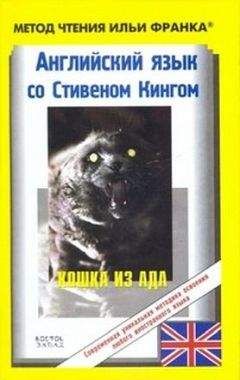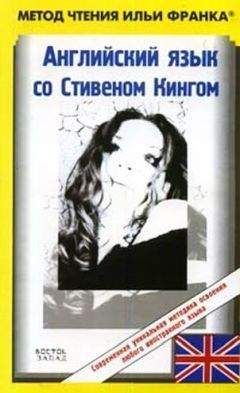Stephen King - Английский язык с Стивеном Кингом
Right (точно). Why else had she laughed (а то почему она /сама/ смеялась)?
thought [TLt], behind [bI'haInd], right [raIt]
He doesn't know anything about me, she thought as she stepped into the hall and pulled the door closed behind her. Probably he was drunk and it seemed funny, that's all. And it was funny, in a way; why else did you laugh?
Right. Why else had she laughed?
Pushing her cart down to 323 (толкая тележку к 323-му /номеру/; to push — толкать; двигать, продвигать) she thought she would give the quarter to Paul (она подумала = решила, что отдаст четвертак Полу; to think). Of the two kids (из двух /ее/ детей), Paul was the one who usually came up holding the short end of the stick (именно Полу обычно не везло: «Пол был тем, с кем обычно происходило самое худшее»; to come up — оказываться; выходить, получаться /врезультатечего-л. илипопрошествииопределенноговремени/; to hold the short end of the stick — /сленг/ расхлебыватькашу: «держать короткий конец палки»). He was 7 (ему было семь /лет/), silent (/он был/ молчаливым; silent — тихий, бесшумный; молчаливый, неразговорчивый) and afflicted with what seemed to be a perpetual case of the sniffles (и страдал от, как казалось, никогда не прекращающегося насморка; to be afflicted with smth. — страдатьоткакой-л. болезни; perpetual — вечный; непрекращающийся; case — случай; заболевание; to sniffle — сопеть, хлюпать/носом/; sniffles — насморк). Darlene also thought (Дарлин также думала) he might be the only 7-year-old (что он, должно быть, единственный семилетний /ребенок/) in the clean air of this high-desert town (в чистой атмосфере этого города, /расположенного/ в горной пустыне; air — воздух, атмосфера; high — высокий; high-desert — пустыня, расположеннаянавысотевыше600 мнадуровнемморя) who was an incipient asthmatic (кто был начинающим астматиком = у которого была начальная стадия астмы).
silent ['saIlqnt], perpetual [pq'petSuql], incipient [In'sIpIqnt]
Pushing her cart down to 323, she thought she would give the quarter to Paul. Of the two kids, Paul was the one who usually came up holding the short end of the stick. He was 7, silent and afflicted with what seemed to be a perpetual case of the sniffles. Darlene also thought he might be the only 7-year-old in the clean air of this high-desert town who was an incipient asthmatic.
She sighed and used her passkey on 323 (она вздохнула и открыла общим/запасным ключом номер 323: «использовала свой общий /запасной ключ для 323-го»; key — ключ; passkey — общий; запаснойключ/вгостинице/), thinking maybe she'd find a 50, or even a hundred (думая = надеясь, что, может быть, она найдет 50 или даже 100 /долларов/), in this room's honeypot (в «горшочке для меда» этого номера). It was almost always her first thought (это почти всегда было ее первой мыслью) on entering a room (когда она входила в номер). The envelope was just where she had left it, however (однако, конверт был именно там, где она его оставила; to leave) — propped against the telephone (приставленный к телефонному аппарату) — and although she checked it (и хотя она его проверила) just to be sure (просто чтобы быть уверенной = так, на всякий случай), she knew it would be empty (она знала /заранее/, что он будет пустым; to know), and it was (так и было).
passkey ['pRskJ], always ['Llw(e)Iz], sure [Suq]
She sighed and used her passkey on 323, thinking maybe she'd find a 50, or even a hundred, in this room's honeypot. It was almost always her first thought on entering a room. The envelope was just where she had left it, however — propped against the telephone — and although she checked it just to be sure, she knew it would be empty, and it was.
There was a one-armed bandit — just that single one — in the lobby of the Rancher's (в холле отеля «Фермер» был = стоялоднорукий бандит = игральныйавтомат — один-единственный; arm — рука; single — один; единственный), and though Darlene had never used it (и хотя Дарлин никогда не пользовалась им = не играла на нем) during her five years of work here (за /все/ пять лет своей работы здесь), she dropped her hand into her pocket (она опустила руку в карман) on her way to lunch that day (по дороге на ланч в тот день), felt the envelope with the torn-off end (нащупала конверт с надорванным краем; to feel — чувствовать; щупать; трогать; to tear — рвать; разрывать; end — конец; край) and swerved toward the chrome-plated fool-catcher (и свернула в сторону хромированной приманки для дураков;plate — пластина; to plate — наноситьпокрытие; fool — дурак; to catch — ловить; поймать). She hadn't forgotten her intention (она не забыла о своем намерении; to forget) to give the quarter to Paul (отдать четвертак Полу), but a quarter meant nothing to kids these days (но в наше время четверть доллара ничего не значит для детей; to mean — намереваться; иметьввиду; значить; these days — вэтидни, внашидни). Why should it (ничего удивительного: «почему он /четвертак/ должен /значить/»)? You couldn't even get a lousy bottle of Coke for a quarter (за четверть доллара не купишь даже несчастную бутылку кока-колы; lousy — вшивый; паршивый; ничтожный). And suddenly she just wanted (и внезапно ей просто захотелось) to be rid of the damned thing (избавится от этой чертовой штуки = монетки). Her back hurt (у нее болела спина; to hurt), she had unaccustomed acid indigestion (она ощущала непривычную изжогу;custom — привычка; accustomed — привычный; обычный; acid — кислота; кислый; indigestion — несварениежелудка, нарушениепищеварения) from her 10 o'clock cup of coffee (от 10-часовой чашки кофе = чашки кофе, выпитой в 10 часов) and she felt savagely depressed (и она чувствовала себя ужасно подавленной; savage — дикий; жестокий; яростный). Suddenly the shine was off the world (вдруг все померкло;shine — свет; сияние; world — мир; to be off — уйти; покинуть), and it all seemed the fault of that lousy quarter (и, казалось, во всем этом был виноват тот паршивый четвертак; fault — вина) as if it were sitting there in her pocket (как будто бы он сидел = лежал там, в ее кармане) and sending out little batches of rotten vibes (и посылал = испускалслабые, вредные /для нее/ импульсы; little — маленький; незначительный; batch — партия; группа; to rot — гнить; портиться; разлагаться; rotten — гнилой; испорченный; плохой, скверный; vibe /сокр. отvibration/ —колебание, вибрация).
indigestion ["IndI'GestS(q)n], savagely ['sxvIGlI], fault [fLlt]
There was a one-armed bandit — just that single one — in the lobby of the Rancher's, and though Darlene had never used it during her five years of work here, she dropped her hand into her pocket on her way to lunch that day, felt the envelope with the torn-off end and swerved toward the chrome-plated fool-catcher. She hadn't forgotten her intention to give the quarter to Paul, but a quarter meant nothing to kids these days. Why should it? You couldn't even get a lousy bottle of Coke for a quarter. And suddenly she just wanted to be rid of the damned thing. Her back hurt, she had unaccustomed acid indigestion from her 10 o'clock cup of coffee and she felt savagely depressed. Suddenly the shine was off the world, and it all seemed the fault of that lousy quarter as if it were sitting there in her pocket and sending out little batches of rotten vibes.
Gerda came out of the elevator just in time to see (Герда вышла из лифта и увидела /ее/ как раз в тот момент; in time — вовремя) Darlene plant herself in front of the slot machine (/когда/ Дарлин усаживалась перед игральным автоматом; to plant — сажать/растения/; to plant oneself — занятьпозицию) and dump the quarter out of the envelope and into her palm (и вытряхивала четвертак из конверта себе на ладонь; to dump — сбрасывать, сваливать/мусор/; вываливать; высыпать).
You (ты)? Gerda said (сказала = удивилась Герда). You? No, never (нет, не может быть: «никогда») — I don't believe it (я не верю этому).
Just watch me (просто смотри за мной;towatch— следить; смотреть), Darlene said, and dropped the coin into the slot (и опустила монету в щель), which read USE 1 2 OR 3 COINS (/возле/ которой говорилось = было написано: “Используйте = бросьте 1, 2 или 3 монеты”;toread— читать; гласить, говориться). That baby is gone ( малютка ушла = монета исчезла; baby— младенец, ребенок; малютка, крошка).


